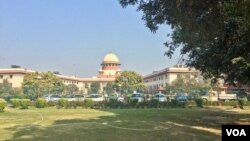The Supreme Court in India has opened hearings on an Islamic custom for ending a marriage.
The high court is considering the legality of immediate, or instant, divorce in Islam. Muslim men are able to end their marriage by saying or writing the word “talaq” -- or “divorce” -- three times.
Muslim women’s rights groups hope the court will rule against instant divorce. They say such a ruling will correct what they call a “long-pending injustice” to Muslim women.
Many groups debated the issue before the hearing on Thursday. Indian Prime Minister Narendra Modi has supported calls to end the practice. But conservative Muslim religious leaders strongly oppose a ban. They accuse the Hindu nationalist Bharatiya Janata Party (BJP) of using political tricks to take away Muslim identity.
The case was brought to the high court by 35-year-old Shayara Khan. Her marriage came to an end after she received a letter from her husband that had the word 'talaq' three times. Those words have been heard or read by thousands of other Muslim women.
In India, each religion has separate laws that govern marriage and adopting someone else’s child as a family member. They also affect maintenance -- the custom that enables a Muslim man to end his marriage without his wife’s approval in just a few seconds.
Shayara Khan says she wanted a voice in the decision that changed her life. She says the Islamic tradition of “triple talaq” violates the Indian constitution -- which protects equality for both sexes.
In her request to the court, Shayara noted that the tradition leaves women weak and defenseless. The request noted that some women have been divorced through Skype and text messages. Several others have joined her appeal to the court.
Activists for women expressed hope as the court considers the legality of the custom. Zakia Soman is with the Indian Muslim Women’s Movement. She said she is “100 percent optimistic” that the court will correct a “long-pending injustice” against Muslim women in India.
“We want a Muslim personal law that enables equality in marriage and family matters,” she said.
The All India Muslim Personal Law Board wants the court to continue to permit “triple talaq.” It says the custom cannot be banned because it is permitted under Sharia, or Islamic, laws.
The group said it has begun teaching Muslim men that the custom should only be used when all attempts at saving the marriage have failed.
Kamal Farooqui is a member of the board. He says the religious laws of Islam cannot be rewritten by governments.
He told VOA, "The whole jurisprudence is a God-gifted one -- it is not a man-made constitution and these laws are the laws of the divine which cannot be changed. Those honorable judges who do not know anything about Islam, who do not know the background of Quran, how can they interpret it?”
Women’s groups say the practice is a misinterpretation of Islamic law. They note that India’s neighbors Bangladesh and Pakistan do not permit the “triple talaq.”
Hasina Khan works at the Bebaak Collective, a women’s organization. She says Muslim religious leaders in India have failed to listen to the concerns of women.
Khan says Muslim women have asked Muslim organizations for help, but “they have not listened, not given priority for the Muslim women’s struggles. That is why we had to come to the court.”
Prime Minister Modi’s government told the court that the custom denies Muslim women “the full enjoyment of fundamental rights under the constitution.” And it said “triple talaq” should not be considered an important part of Islam.
Some Muslims fear that the Hindu nationalist BJP is using the issue to create support for a common family law for people of all religions. The possibility of doing so has been debated for many years in India, but political parties have yet to take action.
I’m Jonathan Evans.
Correspondent Anjana Pasricha reported this story from New Delhi. Christopher Jones-Cruise adapted her report for Learning English. George Grow was the editor.
We want to hear from you. Write to us in the Comments Section, or visit our Facebook page.
_______________________________________________________________
Words in This Story
divorce – n. the ending of a marriage by a legal process
Sharia – n. the religious laws based on the Koran that Muslims follow
jurisprudence – n. the study of law
divine – adj. relating to or coming from God or a god
interpret – v. to understand (something) in a specified way
misinterpretation – n. to understand or explain (something) incorrectly; to interpret (something) incorrectly
Quran – n. Islam’s holy book








